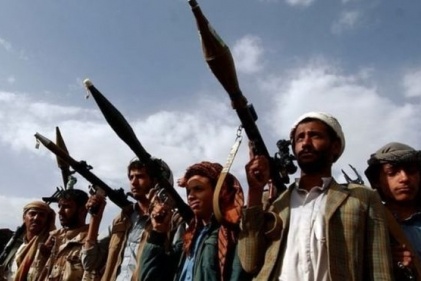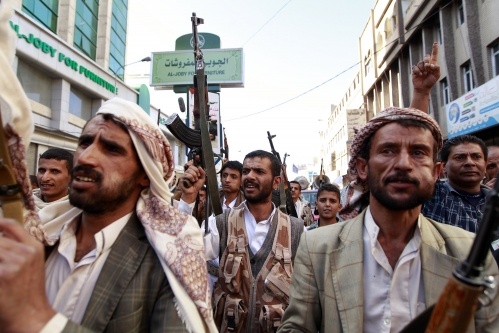Brotherhood in Yemen sells the state to the Houthis under the auspices of Qatar

The Yemeni Congregation for Reform (Islah) – the wing of the
Muslim Brotherhood in Yemen – and the Houthi militia are closely connected to
undermining the Yemeni state, which is selling the people and institutions to
the secret alliance between the Brotherhood and the mullahs’ followers,
sponsored by Qatar, Iran and Turkey, constituting an axis of evil in Yemen.

The axis of evil is manifest in Yemen through Islah being handed all the northern governorates belonging to the Houthis, in addition to ending any trouble or hardship for collusion between the Yemeni Brotherhood and the Iranian-backed Houthis.
Setbacks
Setbacks on Yemen’s fronts are the most prominent signs of the secret alliance between the Brotherhood and the Houthis in Yemen. It looks like military sites are being handed over from influential Brotherhood leaders who have penetrated the army and state institutions to the Houthi militia.
On September 20, 2017, press reported that Islah surrendered its weapons to the Houthis and that Brotherhood leaders in the Yemeni army colluded with the Houthis, leaking to them information, including coordinates of the national army and the Yemeni resistance, which has led to setbacks on many Yemeni fronts.
The Houthis’ control of the districts of Qataba and Al-Hasha in the southern governorate of Dhale, the latest of the Brotherhood's betrayals, is represented by the efforts of the government and the Arab coalition in Yemen and the handing over of important military sites to the Houthi militia in mock battles.
A Yemeni source said that the Yemeni resistance had succeeded in stopping the Houthis from progressing within the governorate, but the Brotherhood’s betrayal led to the loss of Al-Hasha to Houthis.
The source pointed out that Al-Hasha is an important link between Dhale, Ibb and Taiz, which means cutting off supply routes for the Yemeni army between the three governorates.
Dhale, which consists of nine administrative districts, is divided between the Houthi militia and the Yemeni government. The five southern districts, including the governorate’s central district, are held by the Yemeni army, while the other four districts belong to the Houthis.

Taiz
The transfer of sites by the Brotherhood to the Houthis has not only happened in Dhale. Taiz, which is under the control of the Muslim Brotherhood, has also seen Islah surrender military sites to the Houthis.
In the past few days, the al-Aqroud front in Taiz, central Yemen, has also been subjected to treachery by the Brotherhood cutting off supplies to the 35th Armored Brigade, presenting it with a major crisis in the face of any new offensive by the Houthi militia.
A few days ago, the Brotherhood's popular mobilization militia launched a terrorist campaign against the coalition-backed Abu Abbas Brigades in the old city of Taiz and carried out assassinations and kidnappings with the aim of getting the brigades out of the city, which the Brotherhood seeks to control or sharing with the Houthis.
Islah’s militia has committed war crimes against the people of the city, allowing for three Houthi rebel groups to strangle the city and besiege it from more than one direction, which made everyone realize that Islah represents the same destructive agenda in Yemen as the joint Iranian-Turkish project in the whole Arab region.
Last December, the city of Taiz witnessed an intensive military buildup by the Iranian-backed Houthi militia, amid fears of repeated treachery by Islah handing over positions in the governorate to the Houthi militia, threatening the efforts of the Arab coalition to control the governorate and wakening the position of the coalition and the government in Hodeidah.
In November 2015, Islah’s militia surrendered the Shurija area south of Taiz to the Houthi militia. This was repeated again in October 2017, when the Brotherhood militia in Taiz handed over Jabal al-Han, the only link between Taiz and Aden, to the Houthis.
The Houthis are concentrated in the districts of Mawiya and Khadair, east of Taiz, along with districts in the north of the governorate.
A Yemeni military source attributed the Houthis’ attempts to control Taiz because of its strategic geographical location, which serves as a link to Hodeidah.

Marib
The situation is not much different in the northern governorate of Marib. Last December, Yemeni military sources accused the Muslim Brotherhood in Yemen of handing over the district of Sarwah in the oil-rich Marib governorate east of Sana’a to the Houthi militia. This led the Yemeni army and coalition forces to mobilize to restore Sarwah, as it is of strategic importance in battles against the Houthis.

Al-Bayda
Al-Bayda has also been subjected to the Brotherhood’s treachery in favor of the Houthis. Last September, army forces loyal to Islah withdrew from positions in Al-Bayda governorate after having liberated the area, handing it over again to the Houthis.
Yemeni military sources said that military units loyal to Islah stopped fighting in the area and withdrew from several strategic sites, which enabled the Houthi militia to regain their control.

Sana'a Meeting
Yemeni sources revealed that the handover and surrender of military positions by the Muslim Brotherhood to the Houthis falls within the framework of an unspoken agreement between the Brotherhood and Houthi leaders under the auspices of Qatar.
There are also reports of a meeting between the leaders of the Houthi militia, Islah and the al-Qaeda terrorist organization in Sana'a, held with Qatari support and coordination, with the aim of destabilizing the liberated provinces, especially in the south.
The meeting was held at the home of Houthi national security agent Mutlaq al-Marani in Sana'a, headed by the Houthis’ head of military intelligence, Abu Ali al-Hakim, and other leaders.
Sources pointed out that the meeting came as part of unspoken agreements between the Houthi militia and Islah under the auspices of Qatar, which also resulted in the transfer of al-Qaeda elements from the political security prison in Sana’a to Marib.
Sources close to Abu Ali al-Hakim said that the meeting discussed terrorist operations by al-Qaeda elements and targeting military, political and security leaders in the liberated provinces.
The areas liberated by the Arab coalition forces and the Yemeni army from the hands of the Iranian-backed Houthis were an important target for Qatar, which seeks to undermine the legitimate government's efforts to establish security and stability in Yemen.
Doha supports and funds the Houthis to sabotage liberated areas, by providing intelligence to the rebels and millions of dollars to the Brotherhood in Yemen.
In January, Yemeni security forces seized three pick-up trucks belonging to people from Mahra governorate and loaded with AK-47s that were to be handed over to Qatar’s agent in the governorate, who was also a former Yemeni border guard.
Nazar Haitham, a leader of the Yemeni Transitional Council, said that the Brotherhood's attempts to hand over military and strategic positions in Taiz and other volatile fronts to the Houthis reveal the extent of collusion and betrayal by the Muslim Brotherhood against the Arab Coalition, the resistance forces and the Yemeni army.
Haitham added that the battle of Taiz could quickly be resolved, but the presence of Islah’s militia is a disabling factor.
For his part, Yemeni politician and member of the General People's Congress Party Kamel al-Khoudani said that an alliance between the Houthi militia, Islah and al-Qaeda is nothing new, as there have been open lines between them for many years under the auspices of Iran.
In October 2017, there was a meeting in Istanbul between the Houthis and Islah under the patronage and coordination of the Qatari intelligence service, Khoudani said, adding that this indicates an Iranian-Turkish-Qatari arrangement.
Khoudani stressed that the Brotherhood and the Houthis have the support of Qatar and Iran at all levels, enabling them to exert control over Yemen.
The Yemeni politician pointed out that there has been harmony and unity in the positions of the Houthis and the Brotherhood towards the Arab Coalition countries, especially the UAE and Saudi Arabia. The past weeks have seen an escalation of media campaigning against the coalition on social networking sites.





